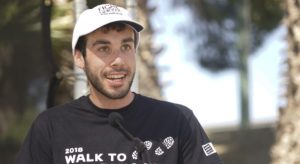To any activist that might need to hear this: if you have stopped advocating for a while or have been too busy helping yourself or your family to volunteer, and you’re worried about being criticized for that if you come back, don’t be. That was the position I was in with Jewish World Watch, and I couldn’t have been more wrong about the reception I would receive when I returned. I might have sacrificed the chance to continue making an impact if I had listened to that misplaced fear.
There is a quote that hangs in the conference room at the JWW office, reading, “You are not obligated to complete the work, but neither are you free to desist from it.” It comes from Pirkei Avot, “Ethics of our Fathers,” a Talmudic text. The message is one of perseverance. JWW doesn’t get to put “number of genocides stopped this year” in letters to donors, and there is no expectation of a time when the organization will have finished its mission and can shut its doors. However, not fixing the global issue does not mean that the lives of thousands of refugees can’t be saved or that even preventing a hundred deaths out of millions isn’t worth the fight.
The quote has also been a source of guilt for me. After participating in the Teen Ambassador Program throughout my senior year of high school and leading a team for the Walk to End Genocide, I was minimally involved with JWW until I returned for an internship this summer, just before my senior year of college.
I was nervous about the interview. I felt it wouldn’t be unreasonable for my supervisors to ask me what I’d done to support this cause during the last three years and to reject me based on the answer: “not much.” I have been trying to figure out so much in my life, and my commitments change each semester with a continued effort to balance school, career building, service, and just enjoying college. But what right did I have, in my position of privilege, not to stay fully committed to the work? Maybe I just shouldn’t have reached out.
This was not the direction the interview took. The team was happy I wanted to come back, which made me happy to be back, and soon I was on board, “fighting the good fight” again. I gained so much from working with JWW, and I hope that in my time here, I paid some of that kindness, knowledge, and experience back to the organization and forward to the survivors we support.
At the end of this summer, Pirkei Avot is going to start ringing in my head again. I don’t yet know how I will distribute my time in my final year of college, and it is going to gnaw at me that there is always more I could be doing to help those less fortunate than I am. I think that feeling is a good one to have, and I don’t think it should ever go away, even for people who work full-time at organizations like JWW. It is a guiding compass. However, just as a real compass won’t account for a gorge with no bridge to cross it, our moral compass can’t predict the path of our lives.
There is another quote from the Talmud that I try to keep in mind at these times: “Whoever destroys a single life is considered to have destroyed an entire world, and whoever saves a single life is considered to have saved an entire world.” This echoes the imperative to keep advocating for a stranger on the other side of the world. Still, it also means that sometimes a situation with a family member or friend will demand more attention than a global crisis. It means sometimes the person you are in the best position to save is yourself. The Talmud teaches us that this is still fighting the good fight.
Research backs up this interpretation. In trying to figure out my next step after I graduate, I’ve consulted the career advice arm of the Centre for Effective Altruism. This evidence-based organization evaluates charities and approaches to pressing world problems to help donors and volunteers maximize their positive impact. The Centre’s first recommendation for an altruistic career is to take care of your own mental and physical health because it will make you a more effective leader and helper in the long run.
So this is what I choose to commit to now, that I hope resonates with other activists my age. I’ll stay on the mailing list, I’ll contact my representatives with the scripts and forms provided, and I’ll keep having conversations and telling the people in my life about these global issues. I believe in the power of small interventions, matchsticks that can keep a fire burning and sometimes ignite a new one. But I also know that it takes bigger, sustained actions to change the world. So I’ll come back to JWW to give another large chunk of my time or money. If not in the next few months, then in August 2023. After all, postponing indefinitely can become postponing infinitely. But my worry about that donation not coming soon enough or being big enough isn’t at all what’s on the mind of the people receiving it. I have to let go of the guilt so that I don’t shy away from future opportunities to give.
We will not desist from the work. And as long as we know that, no one gets to judge our pace, and no one is asking us to complete it.
Photo: Jonah Goldberg speaks at the 2018 Walk to End Genocide. Photo by Bill Sparks


